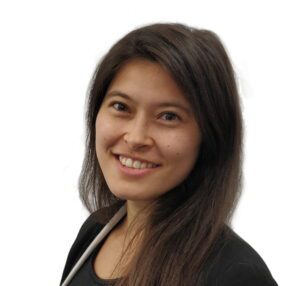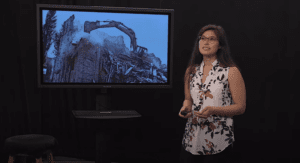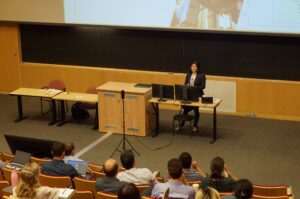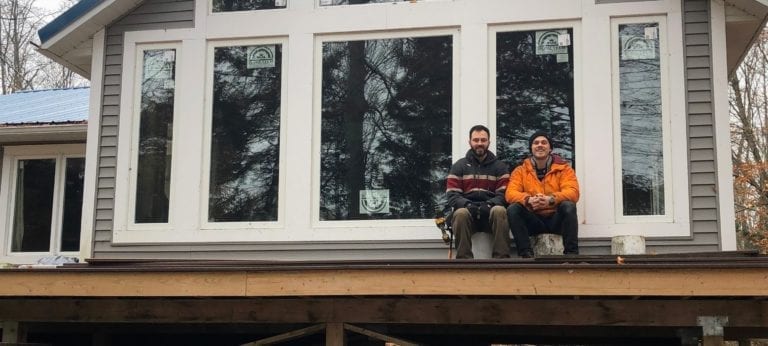
Building Performance Consultant, Energy and Sustainability
Toronto (remote from Ottawa), since 2022
Larissa brings a strong background in sustainable design, green energy systems, and building science to RDH. Her experience includes a wide range of projects including whole building energy modeling simulations, carbon neutral studies, and hygrothermal analysis for heritage enclosures.
What inspired you to join RDH?
I was working in a similar field and noticed RDH’s presence on LinkedIn. I saw that RDH is invested in heritage and sustainability, and this common ground centering on retrofit work inspired me to learn more. Soon after, I participated in a panel discussion for the Canadian Association of Heritage Professionals, where RDH Toronto Principal and Enclosure Discipline Lead, Sarah Gray, was also a panelist.
Sarah was instrumental in helping me understand early on what a great opportunity working out of Toronto would be for my career. I met two more RDH women engineers as part of the interview process (Brittany Coughlin, RDH’s Canada East Regional Director and Energy and Sustainability Specialist as well as Kristen Yee Loong, an Associate of the firm and an Energy and Sustainability Specialist). They were intentional in creating a comfortable, inspiring atmosphere where the dialogue flowed freely.
I had a second RDH interview with Steve Kemp, Principal and Senior Energy and Sustainability Specialist in Toronto, who is a known entity in the sustainability world. Getting his perspective, and hearing him speak, helped me understand how the work environment, growth opportunities, and ability to be a part of cutting-edge projects were things I wanted.
I joined RDH as a Building Performance Consultant in October 2022 and am excited to get more involved with the implementation of low carbon technologies at the detailed design stage through to the measurement and verification post-construction.
Where did your interest in energy and sustainability begin?
My passion for sustainability started at a young age. In grade 3, I was a member of the environmental club at my school, which was an early foray into understanding how we can lessen our environmental impact.
I enrolled in the program Architectural, Conservation and Sustainability Engineering at Carleton University, bringing these interests into focus. During the program, I was enriched with knowledge of heritage conservation and developed a passion for it.
Pursuing my passion for heritage conservation led me to the NSERC CREATE Heritage Engineering master’s program at Carleton University, which created a strong foundation for the work that I do today.
Left Image: Larissa presenting at TEDxCAHP Right Image: Larissa presenting at eSim 2022
What advice do you have for women starting in engineering?
Stay curious and ask a lot of questions. Questions accelerate your understanding of things and speed up knowledge expansion within any certain field of expertise. Do it continually and strive to dig deeper.
Build a network. It is important to connect with people of different backgrounds to understand a diverse pool of knowledge. Expanding your connections comes with the opportunity to experience new things. And sometimes, these things can be life-changing.
What is one of your favorite experiences of being an engineer?
Knowledge sharing. I enjoy whenever I share my knowledge with other people, whether it’s with the public or students. I have guest lectured at Carleton University to make the information accessible to 3rd and 4th-year undergraduate students, as well as post-graduate students and keep them informed about the exciting new and innovative things happening in energy and sustainability. Bringing the next generation along and facilitating their entry into the workforce is extremely important.
I enjoy connecting with the audience after, whether it’s to share ideas, explore new ones, or answer career questions.
What does it mean to you to practice sustainability outside of work?
I have been vegan for the past 4 years. Before that, I was a vegetarian.
In my second year of University, I learned about the environmental impact of eating meat. The environmental impact didn’t fully sink in until 3rd or 4th year of university when I watched the documentary Cowspiracy. The documentary reiterated the number of resources used to raised livestock for consumption, which provoked me to change my lifestyle to align more with my values.
I didn’t own a car until last year because I had a strong desire for my first car to be an electric vehicle. Before owning a car, much of my travel was done on public transit.



